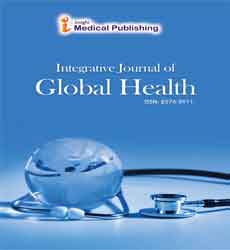ISSN : 2576-3911
Integrative Journal of Global Health
Overview of avicenna (ibn sina) opinion on stomach swelling-Rostami A-4th
Occupational Health Administration, Ministry of Health, Sudan E-mail: Minaezeb@sina.tums.ac.ir
The stomach is the most dilated portion of the GI tract. In Iranian traditional medicine (ITM) stomach is very important organ and its disorders can affect other organs. Avicenna (Ibn Sina), a Muslim scientist of the tenth and eleventh centuries has an important role in the history of medicine in Iran and the world. Canon, his famous book that was the greatest work by Avicenna, was translated into Latin in the 12th century and used as a major reference in medical education from the 12th until the 17th centuries. In addition, this book is one the most important textbooks in ITM. The foundation of ITM system was based on the balancing humors in the human body. In ITM, Mizaj (temperament) plays a key role in preventive, therapeutic, and lifestyle recommendations. Normally there are four humors in the human body: Phlegm or Balgham, Blood or Dam, Yellow bile or Safra, and Black bile or Sauda. Their imbalances in the body causes some disorders such as stomach swelling. Persistent or repeated stomach pain that does not resolve with suitable treatments is the main symptom of stomach swelling. According to Avicenna, swelling is a complex disease. Swelling is thickness and bulging occurring in organ by material accumulation that expand it and fills the cavity. This material is usually infused by another organ or the organ of swelling itself. Stomach swelling is divided into different types according to the materials: “warm” (Haar Safravi or Damavi), “cold Phlegm” (Barede Balghami), and “Solbe Ghaliz” (Hard and thick swelling). The warm swelling is made by not only blood or yellow bile, but also any substance that is warm in essence or is heated by infection. Prolonged and progressive pain, severe inflammation, strong burned, thirst and associated fever, and radiating pain are the symptoms of warm swelling. It may even lead to a mixing of mind, melancholy, and meningitis. “Cold phlegm” swelling is made by phlegm and predisposing factors such as moisture, indigestion, exercise reduction, and other moisture-generating causes. The symptoms and signs of “cold Phlegm” swelling are persistent or repeated pain even during sleep, diluted and increased mouth water, leaden face color, little thirst, poor digestion, poor appetite, hate and suffer moist food, tendency to dry food, without fever, inflammation, and obsession. Sometimes, hard and thick swelling in the stomach is formed primarily by “Sauda” or from transmission and conversion of warm swellings. Phlegm swelling seldom becomes the hard stomach swelling. There are strength to the touch, a lot of dryness, loss of body weight, and other symptoms associated with swelling in the stomach. Treatment in warm swelling includes reducing the swelling matter by venesection or prescribed laxatives, reducing the swelling by rubbing astringent and cold medications over swollen stomach, and avoiding vomiting and potent laxatives. Topical use of Radea (deterrent) drugs, Quince oil, and grated cucurbit, avoiding food, and use of easily digestible food at first and then laxative food and drugs such as beer, cucurbit, and Khiarshanbar (Cassia fistula) is recommended. Safravi swelling remedy is consisted of topical cold drugs such as Sandal (Santalum album), Kafoor (Cinnamomum camphora), alcohol-free beer, and Enabolsalab (Solanum nigrum L.). Treatment in “cold Phlegm” swelling include oral use of astringent solvent drugs such as extract of Celery and Fennel, almond oil, topical use of Baboone (Matricaria chamomilla) and shebet (Anethum graveolens), and avoiding vomiting. Finally, potent solvent drugs is recommended in hard swelling astringent and use of camel bone marrow and cow calf brain in topical drugs is obligatory (2, 8). Based on this study, diagnosis and treatments of stomach swelling can be helpful in patients with persistent or repeated episodes stomachache.
This work was partly presented at Joint Event on 4th European Biopharma Congress & 6th International Conference and Exhibition on Pharmacology and Ethnopharmacology, November 09-11, 2017 Vienna, Austria.
Open Access Journals
- Aquaculture & Veterinary Science
- Chemistry & Chemical Sciences
- Clinical Sciences
- Engineering
- General Science
- Genetics & Molecular Biology
- Health Care & Nursing
- Immunology & Microbiology
- Materials Science
- Mathematics & Physics
- Medical Sciences
- Neurology & Psychiatry
- Oncology & Cancer Science
- Pharmaceutical Sciences
